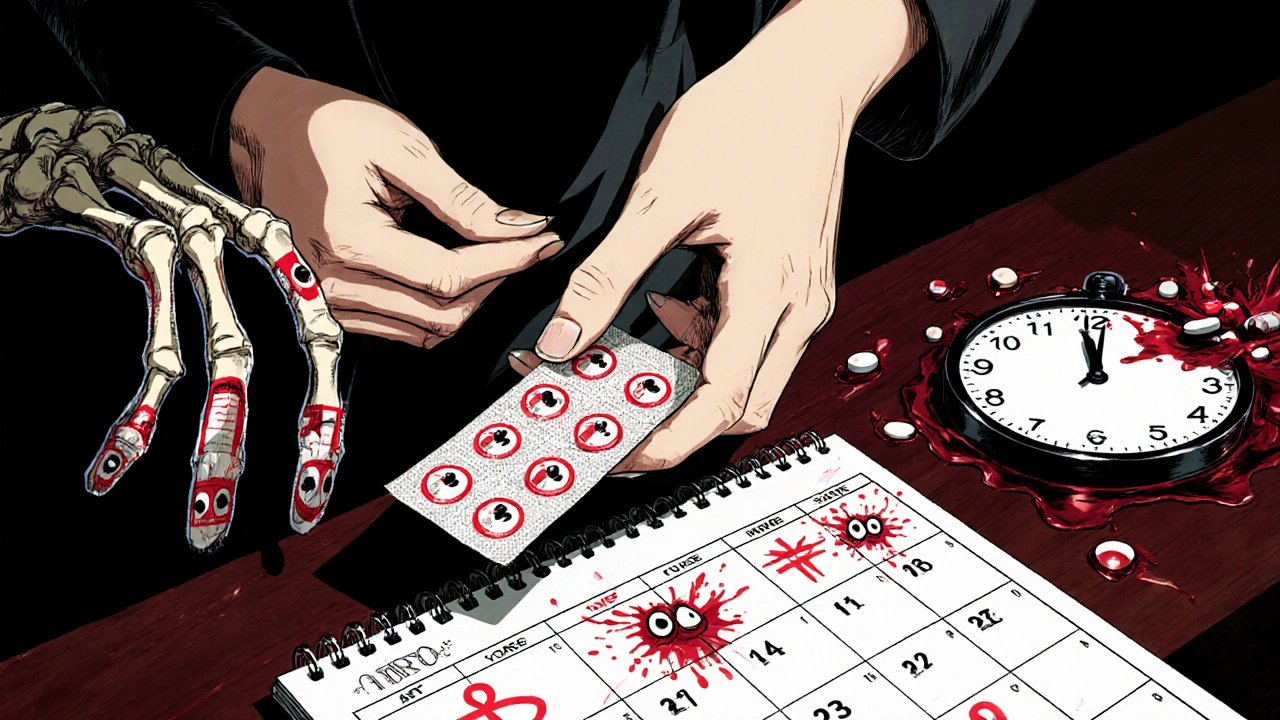Rifampin Birth Control Safety Checker
Check Your Birth Control Safety During Rifampin Treatment
Rifampin is the only antibiotic known to significantly reduce the effectiveness of hormonal birth control. This tool helps you determine if your method is affected and what backup options you should use.
Results:
When you’re on birth control, you expect it to work. You take the pill at the same time every day, you don’t miss doses, and you trust the system. But what if something you’re taking for an infection could make it fail? That’s not a hypothetical. It’s a real, documented risk with rifampin-a common antibiotic used to treat tuberculosis and other serious infections.
Why Rifampin Breaks Birth Control
Rifampin doesn’t just kill bacteria. It also tricks your liver into speeding up the breakdown of hormones. Specifically, it turns on enzymes-mainly CYP3A4-that smash down estrogen and progestin, the two key hormones in most birth control pills, patches, and rings. This isn’t a minor tweak. Studies show that when rifampin is taken with hormonal contraception, estrogen levels drop by 42% to 66%. Progestin levels? They can plummet by up to 83%. That’s not a small leak. That’s a full system failure.And here’s the scary part: you won’t feel it. No extra cramps. No spotting. No warning signs. Your body just stops suppressing ovulation. One study found that two out of four women on rifampin and birth control started ovulating again-despite taking their pills perfectly. That’s breakthrough ovulation. And if you’re ovulating, you can get pregnant.
It’s Not Just Any Antibiotic
You’ve probably heard the myth that all antibiotics mess with birth control. That’s not true. Penicillin? Azithromycin? Doxycycline? None of them have been shown to reduce hormone levels in controlled studies. A 2018 review of over 40 studies found zero evidence that non-rifamycin antibiotics affect contraception.Rifampin is the only antibiotic with solid, repeated proof of this interaction. Even its cousin, rifabutin, has a much weaker effect. In one study, women on rifabutin and birth control didn’t ovulate at all. But with rifampin? The data is clear and consistent across decades of research.
The CDC, WHO, and the American Academy of Family Physicians all agree: rifampin is the outlier. It’s not just a theoretical risk. It’s a proven one. And it’s been known since the 1970s, when women started getting pregnant while on birth control and taking rifampin for TB. Back then, doctors didn’t know why. Now we do-and we have the data to prove it.

What Happens When You Get Pregnant
The baseline failure rate for perfect birth control use is about 0.3%. That’s less than 1 in 300. But with rifampin? That number jumps. We don’t have one exact figure because it depends on dose, duration, and individual metabolism-but it’s significantly higher. The CDC doesn’t give a percentage, but they classify the interaction as Category 3: the risks usually outweigh the benefits.Real-world stories back this up. One woman on Reddit shared that her OB/GYN confirmed her pregnancy was caused by rifampin, even though she never missed a pill. Another, who survived TB treatment, said she got pregnant while on Ortho Tri-Cyclen and rifampin. These aren’t rare cases. In a 20-year career, one infectious disease specialist reported seeing at least three such pregnancies-every single one tied to rifampin.
And it’s not just pills. Patches and rings? Same risk. Any hormonal contraceptive that relies on estrogen or progestin is affected. Even the hormonal IUD? Some studies suggest it might be safer, but the data isn’t strong enough to say for sure. So don’t assume.
What You Should Do
If you’re prescribed rifampin, here’s what you need to do right now:- Stop relying on your hormonal birth control.
- Use a backup method-like condoms-for the entire time you’re taking rifampin.
- Keep using condoms for at least 28 days after your last dose. Why? Because rifampin keeps working in your liver for weeks. It doesn’t just disappear when you stop taking it.
Some doctors suggest switching to a higher-dose pill (50 mcg estrogen), but that’s not a reliable fix. No study proves it works consistently. Others recommend switching to a non-hormonal method, like a copper IUD, or a progestin-only implant. These aren’t affected by liver enzymes. They’re the gold standard if you need long-term, reliable contraception during rifampin treatment.
If you’re on rifampin and you’re not sure what to do, talk to your doctor or pharmacist. Don’t wait. Don’t assume it’s fine. This isn’t a "maybe" situation. It’s a hard yes: your birth control won’t work.

Why This Still Happens
You’d think this would be common knowledge by now. But it’s not. A 2024 review found that many patients still aren’t warned. Some clinicians still believe the old myth that all antibiotics cause failure. Others assume patients will ask. But most patients don’t know to ask.And the stakes are high. In the U.S. alone, about 8,000 people are diagnosed with TB each year. Most of them get rifampin. And about 20% of women between 15 and 44 use hormonal birth control. That’s a lot of overlapping cases. Multiply that globally, and you’re looking at thousands of unintended pregnancies that could be prevented.
Pharmaceutical companies haven’t developed a solution. No new pill formulation resists rifampin. No drug interaction blocker exists. The only tool we have is awareness-and action.
What’s Next?
Researchers are looking into whether genetic testing can predict who’s at highest risk. Some people naturally produce more CYP3A4 enzymes. If we can test for that, we might be able to tailor advice better. But that’s still years away.For now, the answer is simple: if you’re on rifampin, use condoms. Or switch to a copper IUD. Or get a progestin implant. Don’t gamble. Don’t hope. Don’t assume.
This isn’t about being paranoid. It’s about being informed. And if you’re taking rifampin, you need to know: your birth control isn’t working. Not because you did something wrong. But because the science says so.
Can I just take my birth control pill at a different time to avoid the interaction?
No. Changing the time you take your pill won’t help. Rifampin works by changing how your liver processes hormones-not by interfering with absorption. Even perfect timing won’t stop the enzyme surge. The only reliable solution is a backup method.
Is the birth control shot (Depo-Provera) safe with rifampin?
The evidence is unclear. Depo-Provera is a progestin-only injection, and while it’s not affected by most enzyme inducers, there’s no strong data proving it’s safe with rifampin. Most experts still recommend using a backup method like condoms during rifampin treatment, even with Depo.
What if I got pregnant while on rifampin and birth control-is it dangerous?
The pregnancy itself isn’t caused by rifampin-it’s caused by the lack of contraception. Rifampin isn’t known to cause birth defects. If you become pregnant, stop taking rifampin immediately and consult your doctor. Your pregnancy can proceed normally, but you’ll need to manage your TB treatment carefully during pregnancy.
Are there any birth control methods that aren’t affected by rifampin?
Yes. Non-hormonal methods like the copper IUD are completely unaffected. Progestin-only implants (like Nexplanon) also show no significant drop in hormone levels during rifampin use. These are the safest options if you need reliable contraception during rifampin treatment.
How long after stopping rifampin should I wait before trusting my birth control again?
Wait 28 days. Rifampin keeps inducing liver enzymes for weeks after you stop taking it. Your body needs that time to return to normal hormone metabolism. Going back to your pill, patch, or ring before then could leave you unprotected.
Can I use emergency contraception if I had unprotected sex while on rifampin?
Yes, but not the kind with hormones. Emergency contraceptive pills (like Plan B) contain progestin, which rifampin will also break down. Your best bet is a copper IUD, which works as emergency contraception and remains effective regardless of enzyme inducers. It’s the most reliable option.


Georgia Green
November 18, 2025 AT 08:55i took rifampin for tb last year and just assumed my pill was fine since i never missed a dose. turns out i got pregnant. no warning signs, no spotting. just... baby. my dr never told me. i had to find this on reddit. please, if you're on this med, use condoms. no excuses.
Christina Abellar
November 18, 2025 AT 09:24Thank you for posting this. So many people don’t realize rifampin is the only antibiotic that does this. I’m a nurse and I still see patients confused about doxycycline vs. rifampin. Clear info like this saves lives.
Eva Vega
November 19, 2025 AT 02:28From a pharmacokinetic standpoint, the CYP3A4 induction profile of rifampin is well-documented as a potent enzyme inducer with a long half-life post-administration. The 28-day washout window is evidence-based, not anecdotal. Hormonal contraceptive efficacy is predicated on maintaining therapeutic serum concentrations-rifampin disrupts hepatic first-pass metabolism, leading to subtherapeutic steroid exposure. Non-hormonal alternatives are not just recommended-they’re standard of care in this context.
Matt Wells
November 20, 2025 AT 09:06It is astonishing that this remains a point of confusion in 2024. The interaction between rifampin and hormonal contraceptives has been established since the 1970s. To suggest that patients are somehow at fault for not knowing is to abdicate the physician’s duty to educate. This is not a matter of personal responsibility-it is a systemic failure of clinical communication.
George Gaitara
November 22, 2025 AT 04:21Wait, so you're telling me I can't just take my pill an hour earlier or later to "beat" the enzyme surge? That's ridiculous. I mean, come on. This feels like medical fearmongering. I'm sure if I just doubled my pill dose, it'd be fine. Right? Someone tell me I'm not crazy.
Joyce Genon
November 22, 2025 AT 14:28Let’s be real here-this whole post is just another way to scare women into using condoms or IUDs because Big Pharma doesn’t make enough money off them. The CDC says "risks usually outweigh benefits"-that’s not a warning, that’s a suggestion. I’ve known three women who got pregnant on rifampin and birth control, and guess what? They all had perfect compliance. But here’s the thing: pregnancy isn’t a medical emergency. It’s a life choice. And if you’re not okay with that, maybe you shouldn’t be on birth control in the first place. Also, the copper IUD is expensive and painful. Who even has time for that? This feels less like science and more like guilt-tripping.
John Wayne
November 23, 2025 AT 22:16Interesting how this is framed as a public health crisis when the real issue is that women are too lazy to switch to non-hormonal methods. If you can’t be bothered to get an IUD, don’t complain when your pill stops working. Also, the 28-day rule? Arbitrary. My cousin took rifampin and went right back on her pill after 10 days. No pregnancy. Coincidence? I think not.
Julie Roe
November 24, 2025 AT 14:44I just want to say thank you for writing this so clearly. I’ve been a nurse for 18 years and I still have patients who come in after a surprise pregnancy, saying "I took my pill every day." It breaks my heart. And honestly? Most of them are terrified to ask their doctor because they think they’ll be judged. This post doesn’t judge. It just tells the truth. If you’re on rifampin, please, please, please don’t rely on your pill-even if you’re perfect. Use condoms. Talk to your provider. Get a copper IUD if you can. You’re not being paranoid-you’re being smart. And if you’re reading this and you’re not on rifampin yet? Share this. Someone you love might need it. I’ve sent this to three friends already. One of them just called me crying because her doctor never told her either. We need more of this. Not less.